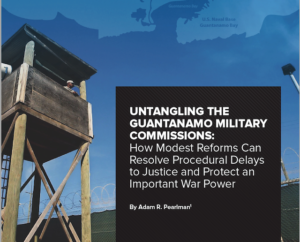![]()
April 22, 2019
Contact: Jessica Jones
[email protected]
703-993-8061
“Untangling The Guantanamo Military Commissions: How Modest Reforms Can Resolve Procedural Delays to Justice and Protect an Important War Power”

Arlington, VA – On April 22, 2019, the National Security Institute (NSI) at George Mason University’s Antonin Scalia Law School published its latest NSI Law & Policy Paper, “Untangling The Guantanamo Military Commissions: How Modest Reforms Can Resolve Procedural Delays to Justice and Protect an Important War Power,” by NSI Visiting Fellow Adam R. Pearlman.
This NSI Law & Policy Paper:
- Describes the history and purpose of the military commissions convened at Guantanamo Bay as well as the protracted delays plaguing several of the government’s highest-priority commissions trials.
- Evaluates the rationale behind military commissions “apparent unlawful influence” jurisprudence, the contempt powers of the military commissions trial judiciary, and detainee monitoring at Guantanamo Bay – issues that have contributed significantly to the unreasonably long pre-trial litigation phase of the commissions.
- Argues that modest reforms would enable the commissions to accelerate the pace of pretrial litigation without undermining the rights of the Accused.
- Proposes actionable recommendations that can help resolve these procedural delays to justice and protect an important war power for the United States.
“This new paper from Adam Pearlman, an NSI Visiting Fellow with extensive experience on the military commissions taking place at Guantanamo Bay, sets out some very common-sense, actionable recommendations that would have significant benefits in expediting the proceedings while also providing appropriate protections for the accused; as such, it ought be required reading for those in DOD and Congress who care about these important matters,” said Jamil N. Jaffer, Founder and Executive Director of the National Security Institute at GMU’s Scalia Law School.
The paper is available here.
Mr. Pearlman’s bio can be found here.
About the National Security Institute
The National Security Institute serves as a platform for research, teaching, scholarship, and policy development that incorporates a realistic assessment of the threats facing the United States and its allies, as well as an appreciation of the legal and practical challenges facing U.S. intelligence, defense, law enforcement, homeland security, and cybersecurity communities. NSI draws on the experience of its visiting fellows, as well as its highly distinguished advisory board and faculty, to produce timely research and policy materials that deliver insightful analysis and actionable recommendations to senior policymakers in the White House and key departments and agencies, as well as those on Capitol Hill.
About George Mason
George Mason University is Virginia’s largest public research university. Located near Washington, D.C., Mason enrolls more than 33,000 students from 130 countries and all 50 states. Mason has grown rapidly over the past half-century and is recognized for its innovation and entrepreneurship, remarkable diversity, and commitment to accessibility.
About the Scalia Law School
The Antonin Scalia Law School at George Mason University is defined by three words: Learn. Challenge. Lead. Students receive an outstanding legal education (Learn), are taught to critically evaluate prevailing orthodoxy and pursue new ideas (Challenge), and, ultimately, are well prepared to distinguish themselves in their chosen fields (Lead). It has been one of America’s top-ranked law schools for the last fifteen years.
